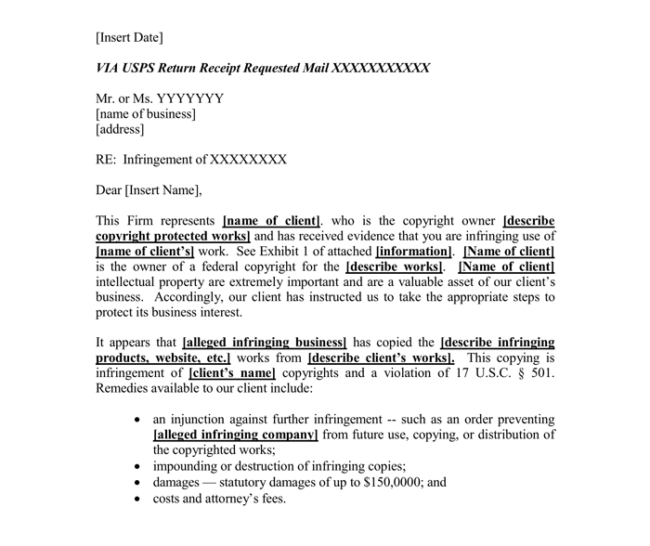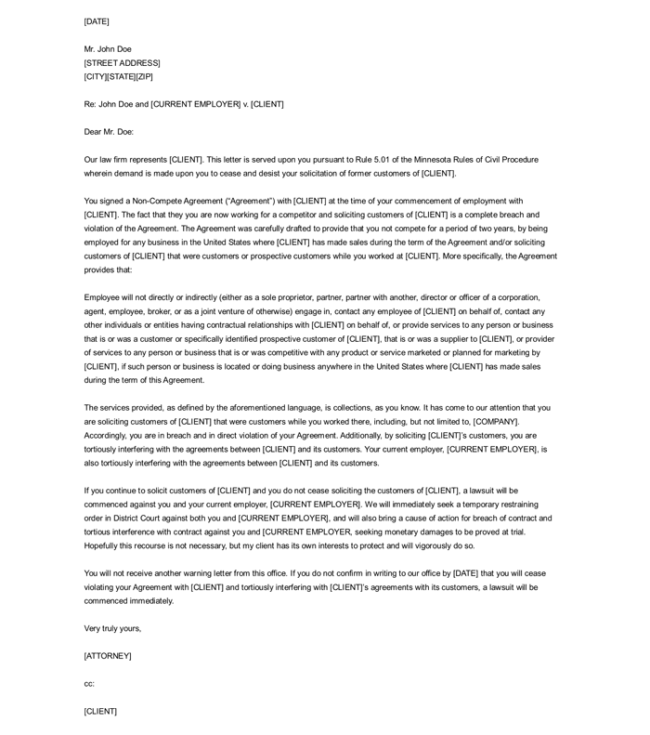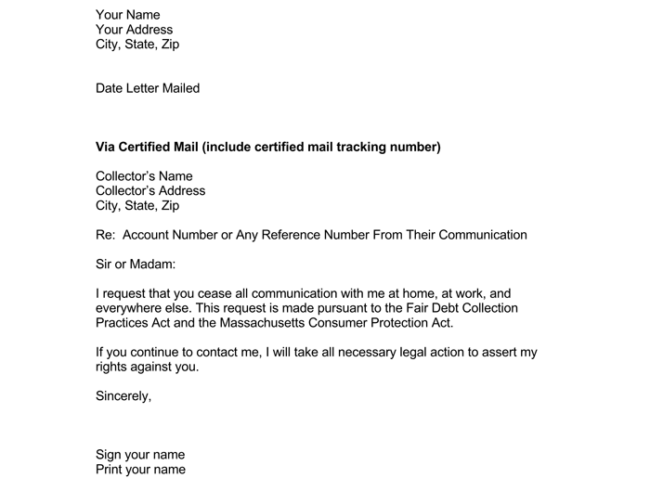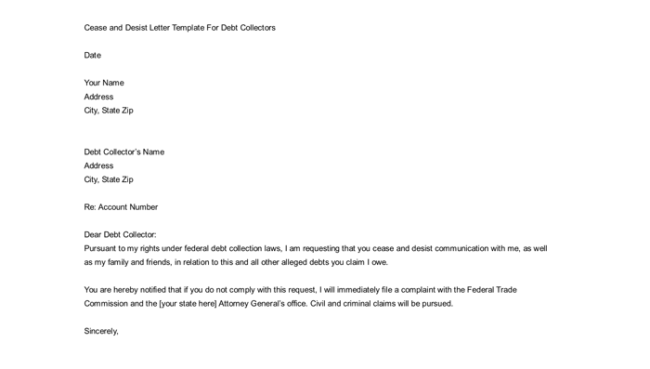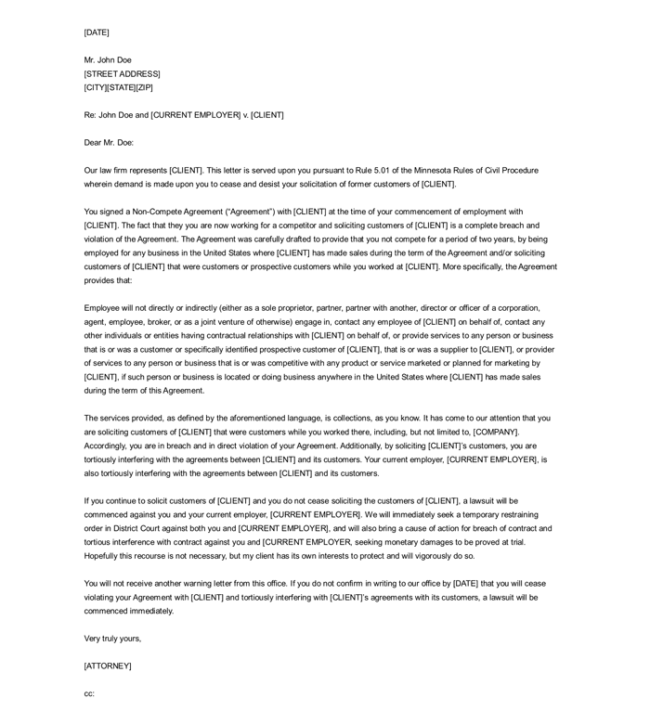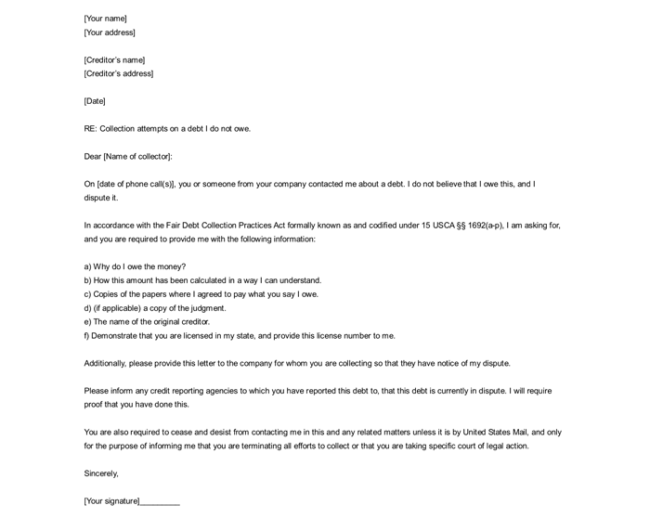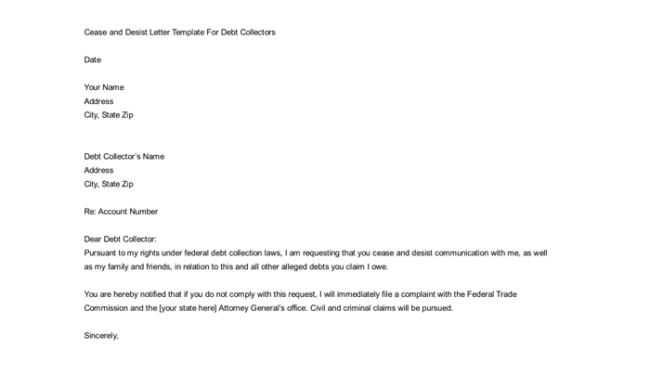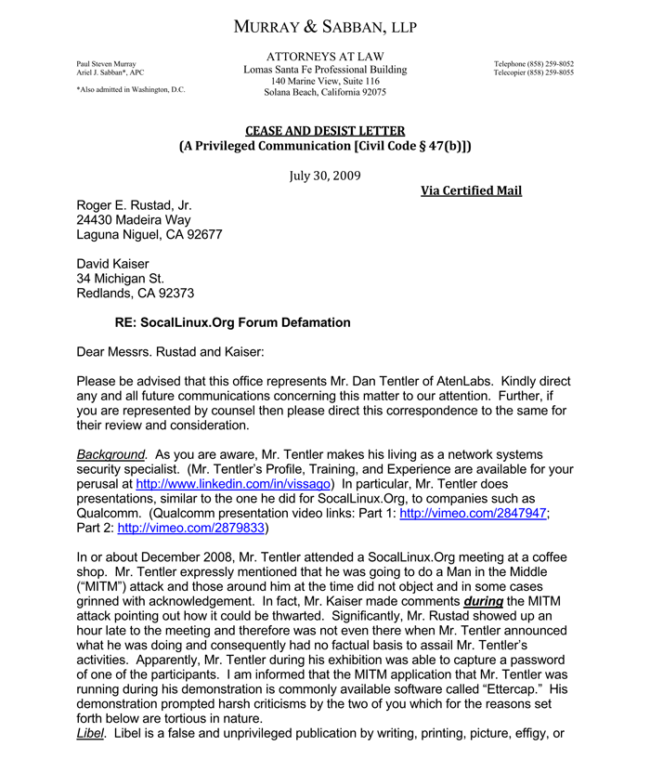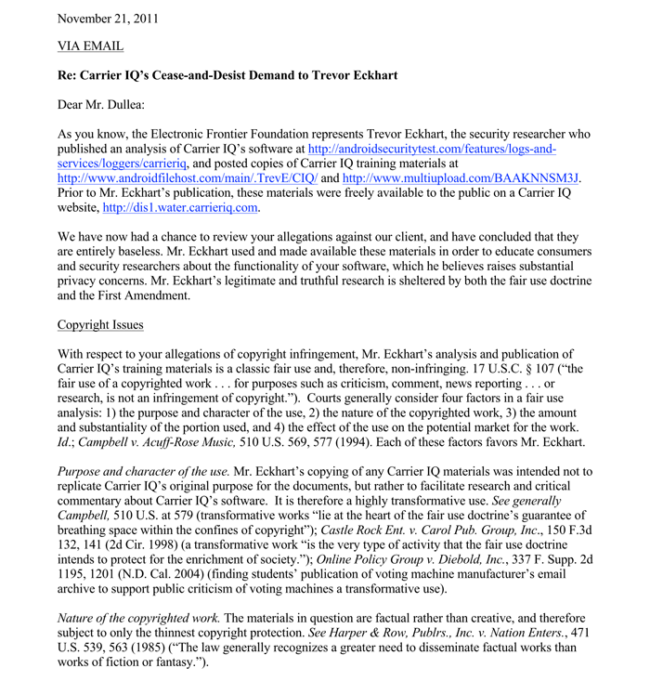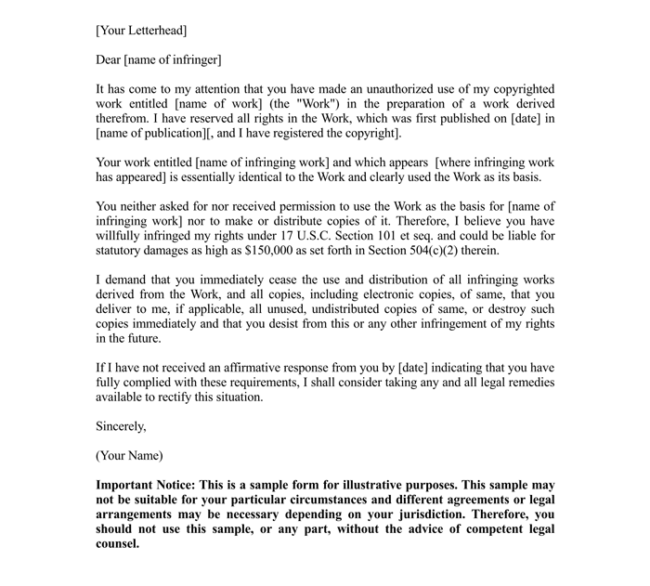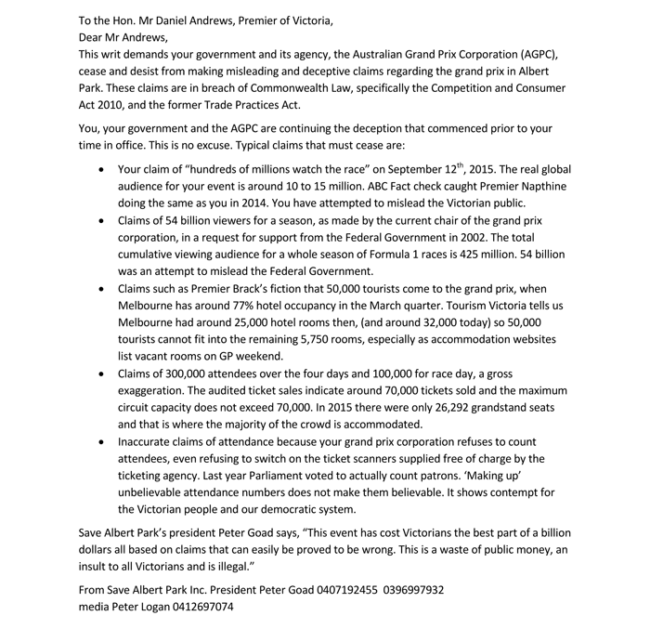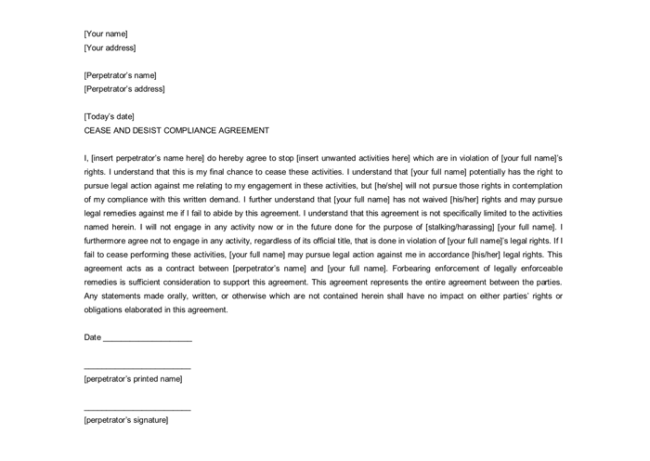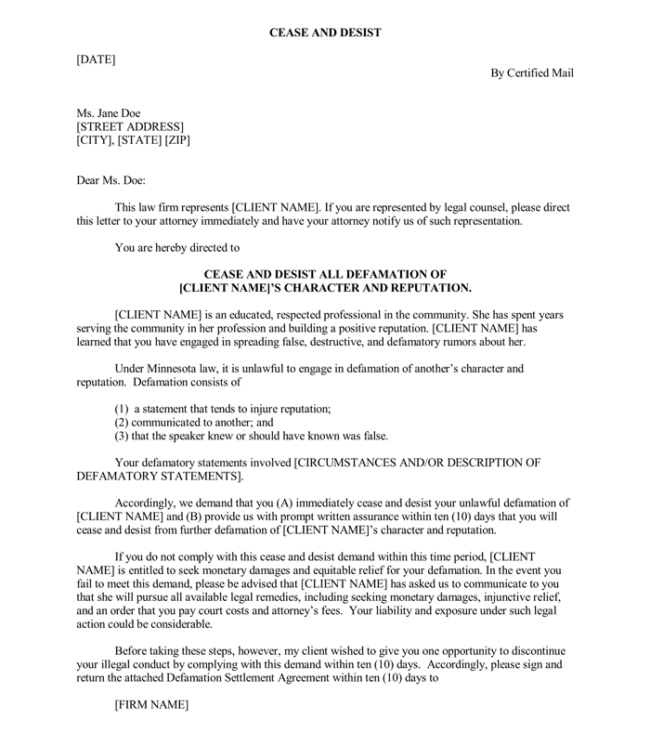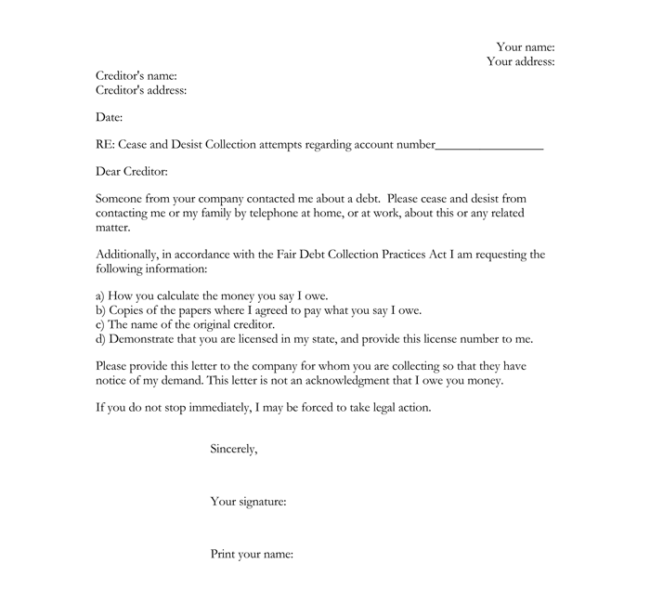A cease and desist letter is defined as a letter issued by an individual or an entity to another individual or entity formally notifying them to stop an activity or behavior that infringes on the issuing party’s legal rights.
It is ordinarily the first step taken by the issuing party to warn the offender before taking legal action if they do not stop doing the activity or behavior highlighted in the letter.
This letter is not deemed a legally binding document as it represents the opinion of the issuing party. Its name is derived from the words “cease” and “desist.” Cease basically means “stop,” and desist means “to cease to proceed or act” going forward.
note
It is also known as a stop harassment letter or a demand letter.
When issuing this letter, it is common practice to provide the recipient with a timeframe of 10-15 days within which to reply to the letter. If the recipient fails to respond within this timeframe, the issuer may take legal action against the offender. It is advisable to send it with a return receipt so that a signature upon delivery can serve as proof of receipt.
Cease and Desist Templates
Following are the free cease and desist templates that you can download:
Differences between Cease and Desist Order
Depending on the situation, one can choose to use either a letter or an order. These two documents vary in certain ways that might influence the application of each.
The following are the differences between the two:
| Cease and desist order | Cease and desist Letter |
| Is legally enforceable as it has the legal power to prohibit the offender from continuing the indicated activity | It has no legal power (is not legally enforceable) and therefore cannot prohibit the offender from continuing the specified action. However, it orders the offender to quit, or they will be sued |
| Typically issued by government agencies or courts | Ordinarily written by an attorney or anyone |
| Succeeds the filing of a lawsuit | Precedes the filing of a lawsuit |
| Forces the offender to stop the specified action | Requests the offender to stop the activity |
| The offender is expected to respond to the government agency or a court | The offender is expected to issue a response to the issuer |
| The consequences of not obeying the order include jail time and fines | The consequences of not obeying the request are potential litigation |
Common Uses of Cease and Desist Letters
Some of the common reasons why people use it are discussed below:
Infringement of intellectual property right
Trademarks, patents, and copyrights for intellectual property are highly valued. When third parties use intellectual property without permission, it is considered an infringement of the owner’s rights because it frequently represents an original product or technique with monetary value. Therefore, owners can, in such a situation, issue a letter warning of legal action if the offender fails to honor the request.
Debt collection services
In an effort to collect what they are owed, debt collectors will often contact borrowers via phone calls, surprise visits, emails, mail, etc. Such behavior might be considered harassment by most people, which is a violation of how debt collectors are expected to behave under the Fair Debt Collection Practices Act.
Therefore, borrowers can urge the debt collectors to cease and desist from such behavior using this letter, or else they face statutory penalties.
note
It does not exempt one from the debt obligation and is only applicable to debt collection agencies and attorneys and not in-house collection departments.
Slander and libel
Slander and libel are forms of defamation where a party spreads rumors about another person or business. Libel is a type of rumor that is spread in writing, whereas slander is spread orally. Defamation can cause harm to a business by reducing sales and to an individual by harming their reputation and thus hindering their professional opportunities.
This letter can be issued to the offender, urging them to retract the false statements they had previously made. When opposing slander and libel, the letter should quote the defamatory statement, provide reasons why it is untrue, and highlight the damage it caused,
EXAMPLE
Reputational humiliation, monetary losses, and emotional distress.
Property disputes
It is also issued to resolve property disputes such as boundary encroachment. However, if the adjacent property owner encroaches on one’s property, other informal dispute resolution methods should be sought. If the issue persists, the letter can be used to warn them of potential litigation.
Harassment
This letter is normally used to warn individuals or entities to stop the harassment. Harassments are usually not straightforward issues, and it is therefore advised that one understands state harassment laws and uses good judgment before using such a letter against harassment.
Harassment can take place in different forms, such as:
- Threatening behavior: Threatening behavior such as stalking can be warned against through it.
- Aggressive or excessive communication: Some people communicate too aggressively, such as by yelling or using vulgar language while being insulting and offensive. One can use this letter to urge them to refrain from continuing that type of behavior.
- Cyberbullying or defamation: Cyberbullying is a common practice nowadays and can lead to people’s names and reputations being tarnished. Issuing this letter will sometimes be enough to warn the offender.
Contract violation or fraud
Parties in breach of a contract can also be issued this letter urging them to stop violating the other party’s contractual rights.
EXAMPLE
Employees who sign a non-compete agreement can be issued it should they breach it later on. One can also use it to warn an individual or company intending to obtain money through fraudulent means such as deception or false identity.
How do I Cease and Desist Letter?
Anyone can write it. However, for it to serve its intended purpose, it should be properly and professionally written. The following steps can be used as a guide to creating an effective letter that contains all the key provisions needed.
- Step 1: Provide the names and contact information of the involved parties (i.e., the issuer and recipient). Details such as mailing addresses, phone numbers, and email addresses should be provided for effective communication/responses between the parties.
- Step 2: Provide a subject line that clearly states the infringement(s) or violation(s)—the action the offender should cease and desist from taking—and the purpose of writing the letter. Then include specific details that prove there has been an infringement of rights.
- Step 3: Outline the steps the at-fault party needs to take to remedy the situation. Then state the timeframe awarded for them to take corrective action before legal action is taken.
- Step 4: Notify them of a potential lawsuit if they do not cease and desist from the specified activity or behavior or if corrective measures are not taken in the given time frame.
- Step 5: Attach any physical proof that is available to support the claim. Evidence can be attached to the letter in the form of pictures, documents, etc.
- Step 6: Provide a signature and the date when the letter was issued
Sending the Cease and Desist Letter
There are various methods of delivering it to ensure that the recipient receives it and to avoid situations where they claim they did not receive it.
These methods of delivery include the following:
- In-person delivery: The issuer delivers the letter personally to the recipient and obtains an Affidavit of Service as proof of delivery.
- Registered mail service: The letter is sent via registered mail with a request for a return receipt upon delivery. This provides a tracking number and requires a signature upon receipt, serving as evidence of delivery.
- Process server: A professional process server is hired to deliver the letter to the recipient, and an Affidavit of Service or its equivalent is obtained as proof of delivery.
It is also important to keep a copy of the letter for your records and provide a copy to your attorney (if one is used). Documenting the time, date, and place of the letter’s delivery can also be helpful in the event of any disputes or legal proceedings in the future.
6 Templates and Samples of Cease and Desist Letters
Cease and desist letter template to stop trademark or copyright infringement
If someone is infringing on a trademark or copyright that belongs to you, you can use the following template to formally demand that they stop infringing. The letter indicates that you are prepared to pursue legal action if they continue their infringement.
template
Dear _______:
You are currently using __________ (a piece of copyrighted/trademarked work) without our authorization, which is copyrighted in accordance with Title 17 of the U.S. Code, United States Copyright Law.
We have found this unauthorized use of our work currently being used at __________(where/how work is being used).
If we have not received a response from you by __________ (date) agreeing that you have ceased using our work and will desist from further use in the future, I shall consider taking legal action to rectify this situation.
Sincerely,
___________ (name, signature).
Template cease and desist letter to stop harassment or other invasions of privacy
Incidents of harassment and stalking can be addressed with this letter. Sending it shows that you take the unwelcome attention seriously and are prepared to deal with it. People frequently decide that the potential legal fees are not worth the risk and stop engaging in the behavior.
template
Dear __________,
This letter has been served as a notice of your recent acts of unwarranted harassment. You are required to cease and desist all acts of harassment, including but not limited to:
______________________________________________________(acts).
The listed actions are unwanted and unwarranted. This cease and desist letter shall serve as a pre-suit letter requesting that you provide written assurance within _____ (days) that you will discontinue further actions.
Sincerely,
__________(name, signature).
Template cease and desist letter to stop libel or slander
It is the perfect tool for stopping someone from making false or damaging statements about you to the public. In the letter, you can explain what damage they caused you and request that they stop.
Template
Dear ______,
(Name) is a respected professional in this community. We have been informed that you have been spreading inaccurate and malicious information to damage their personal and professional reputations.
Under the laws of ________ (State), it is unlawful for an individual to make deliberate, unfounded statements with the intent of harming an individual’s reputation.
These defamatory statements include but are not limited to: __________________________________________________(statements).
This serves as a pre-suit letter requesting that you provide us written assurance within ___ (days) that you will cease and desist from issuing further inaccurate statements.
Sincerely,
__________(name, signature).
Template cease and desist letter to prevent property boundary violation
If a neighbor keeps encroaching onto your property, you can use such a letter to request that they stop at once or suffer the legal consequences. However, in most cases, you should probably try to talk to your neighbor first and politely ask them to stay on their own side of the property line.
template
Dear ______,
This letter is in response to your recent encroachments on a property boundary on ______(dates).
Under the laws of _______ (State), it is unlawful for an individual to encroach on the property boundary belonging to another individual without express permission.
These acts of property boundary violation include, but are not limited to:
__________________________________________________(violations).
This serves as a pre-suit letter requiring that you provide written assurance within _____ (days) that you will cease and desist from further acts of trespassing, or a lawsuit may be commenced.
Sincerely,
__________
Template cease and desist letter to prevent debt collectors
Maybe you are having some trouble with debt collectors. In any situation, dealing with debt collectors can be tough. This letter can force aggressive debt collectors to stop harassing you with constant communication or surprise visits. If you write and send this letter, the debt collectors will have no choice but to contact you one more time and then cease communication.
template
Re: Stop ALL Debt Collection _______ (Calls/Visits)
Dear ______,
This letter is in response to the _________(form of contact) I have received from you at the following ____________(telephone number or address).
I dispute the validity and accuracy of this debt and demand that you cease and desist from all communication and collection activities related to this debt, as well as any other debts that you claim I owe. I am asserting my rights under the Fair Debt Collection Practices Act (FDCPA) and other applicable laws.
This letter has been sent by certified U.S. mail with a return receipt and will be presented at court if said contact continues.
Sincerely,
__________
Template cease and desist letter to stop breach of contract
It can be used to prevent someone from interfering with your contractual rights. For example, if you have an employment agreement with someone but a competing business hires that person in order to hurt your business, you might want to send this letter.
template
Dear ______,
This letter is served upon your breach of the __________(agreement) that was signed on _________(date).
You signed into a valid contract that was breached or violated by __________________________________(breach of contract).
You will not receive another warning. If you do not confirm in writing by ______ (date) that you will cease and desist violations of our agreement, a lawsuit may be commenced.
Sincerely,
__________
Sample Cease and Desist Letters
Sample Cease and Desist Letter to Stop Trademark or Copyright Infringement
Dear Mr. John Smith,
This letter serves as a formal notice from Mainstay Innovations LLC regarding your unauthorized use of our trademarked logo and copyrighted software, “QuickTech,” on your website, SmithTechSolutions.com.
We have evidence that you have been using our trademark and software since January 5, 20XX, without our permission. This act constitutes a direct infringement of our intellectual property rights under the United States Trademark and Copyright Laws.
We demand that you immediately cease the use of our trademark and copyrighted material. Failure to do so will result in stringent legal actions, including but not limited to, seeking monetary damages and an injunction against your company.
Sincerely,
Emily Johnson, Legal Counsel
Mainstay Innovations LLC
Sample Cease and Desist Letter to Stop Harassment or Other Invasions of Privacy
Dear Ms. Alexandra Green,
I am writing on behalf of my client, Ms. Lily Thomas, to formally request that you cease and desist from all forms of communication and interaction that constitute harassment and invasion of privacy. Your actions, including repeated unwarranted phone calls and following Ms. Thomas to her workplace at 123 Main St., Springfield, since February 20XX, are unacceptable.
Should you fail to stop these actions immediately, we will be forced to take legal action against you for harassment, seeking both injunctive relief and damages.
Sincerely,
David Miller, Attorney at Law
Sample Cease and Desist Letter to Stop Libel or Slander
Dear Mr. Kevin Lopez,
This letter is regarding your false and defamatory statements about my client, Dr. Sarah Bennett, a respected physician at Springfield General Hospital. Your public claims, specifically on social media platforms and at the community meeting on March 12, 20XX, accusing her of medical malpractice, are baseless and damaging to her reputation.
We demand an immediate retraction of these statements and a public apology. Failure to comply will result in a defamation lawsuit, seeking compensatory and punitive damages.
Sincerely,
Rachel Lee, Attorney at Law
Sample Cease and Desist Letter to Prevent Property Boundary Violation
Dear Mr. and Mrs. Peterson,
I am writing to address the issue of your new fence, constructed in April 20XX, which encroaches approximately 5 feet into my property at 456 Oak Lane. This is a clear violation of the agreed property boundaries established in our deed.
I request that you cease any further construction and remove the portion of the fence on my property within 14 days. Failure to comply will result in legal action for property encroachment and trespass.
Sincerely,
Michael Brown
Sample Cease and Desist Letter to Prevent Debt Collectors
Dear Brightway Collections Agency,
I am writing regarding your repeated attempts to collect a purported debt from me, Jane Doe, regarding account number #123456789, which I dispute. Your actions, including multiple daily phone calls and sending letters to my workplace, constitute harassment under the Fair Debt Collection Practices Act.
I demand that you cease all communication with me regarding this debt. Non-compliance will result in a formal complaint with the Consumer Financial Protection Bureau and potential legal action for harassment.
Sincerely,
Jane Doe
Analysis
The cease and desist letters provided are useful samples for anyone needing to write a similar document, combining clarity, specificity, and a professional tone to effectively convey legal demands. The strengths of these letters, which make them useful guides, can be distilled into key aspects:
- Clarity and Specificity: The writers begin the letters with a clear identification of the recipient and the issue, eliminating any ambiguity. They include detailed information like specific actions, dates, and relevant legal references, which not only bolster the legal standing but also guide others to incorporate similar details in their letters.
- Professional Tone: The language strikes a perfect balance between assertiveness and legal decorum, which is crucial in legal documents to convey seriousness while maintaining respect for legal processes.
- Legal References: The writers make references to applicable laws and legal rights, which adds authority and informs the recipient of the legal basis for the demands. It’s a useful guide for others to research and cite relevant laws in their letters.
- Conciseness: Despite being detailed, the letters remain concise, focusing solely on relevant information. This brevity ensures the letters are likely to be read in full and demonstrates effective legal communication.
In essence, these letters serve as prime examples due to their structured approach, detailed content, and professional tone, showing how to communicate a legal demand effectively and respectfully. They are valuable for anyone needing to draft a legally sound and persuasive cease and desist letter.
Tips for Writing an Effective Cease and Desist Letter
The following tips should be kept in mind before issuing a letter of cease and desist.
- Accurate and Clear Information: It should contain accurate and clear information, including the details of the alleged infringement or wrongful conduct, the specific actions that the recipient is being asked to cease and desist from, and any relevant legal grounds or statutes supporting the claim.
- Proper Sender and Recipient: The letter should be sent by the appropriate party, such as an attorney or a representative of the aggrieved party, to the correct recipient, usually the person or entity engaging in the alleged wrongful conduct.
- Legal Basis: It should identify the legal basis for the claim, such as a specific law, regulation, or legal principle that supports the demand to cease and desist. This may include copyright or trademark infringement, defamation, harassment, or other legal grounds, depending on the nature of the alleged conduct.
- Tone and Language: The tone and language of the letter should be professional, factual, and non-threatening. The letter should avoid using derogatory or inflammatory language that could potentially escalate the situation or undermine the credibility of the claim.
- Supporting Evidence: If available, it should include any relevant supporting evidence, such as copies of copyrighted materials, screenshots of infringing websites, or other documentation that supports the claim being made.
- Deadline for Compliance: It should specify a reasonable deadline by which the recipient is required to comply with the cease and desist demand. This allows the recipient adequate time to respond and take appropriate action.
- Consequences of Non-Compliance: The letter may also include a statement indicating the potential consequences of non-compliance, such as further legal action, including litigation, if the alleged wrongful conduct continues after the deadline for compliance.
- Seek Legal Advice: It is important to seek legal advice from a qualified attorney to ensure that the letter is drafted in compliance with applicable laws and regulations and that it effectively communicates the intent and demands of the sender.
- Follow-Up: It may be necessary to follow up on this letter to ensure compliance or to take further legal action if necessary, depending on the response or actions of the recipient.
What to Expect After Sending the Letter
Once the letter has been sent, one should wait for the offender to respond before evaluating their next steps. Issuing this letter is sometimes not the final step in resolving the issue at hand.
Issuers should plan for two outcomes, one where they can compromise and one where they cannot. If the offender contacts you and affirms that they are not legally required to cease the specified action or are not infringing the said rights, negotiations can be held to resolve the issue.
However, if one cannot compromise or the offender fails to respond to the letter, legal action would be taken. Legal action can result in compensation for damages and/or a court-issued cease and desist order directing the offender to stop the specified activity.
Frequently Asked Questions
Some of the common reasons why people use a cease and desist letter are as discussed
Yes. Anyone who believes their legal rights are being infringed can send a cease and desist letter without involving an attorney. However, an attorney can be helpful in writing a legally accurate and persuasive letter and providing necessary legal advice related to the issue at hand.
No, you do not need a lawyer to send it. All you need to do to send this document is write it and mail it to the recipient. However, there are reasons why you might want to consult with a lawyer prior to sending one. For example, civil claims can be incredibly complicated, expensive, and painful. By advising you on your rights and determining whether this letter is actually your best option, an attorney can help you avoid a particularly arduous legal battle. They can even write the letter for you, which is a real advantage because letters sent from attorneys are taken more seriously than letters sent from individuals.
Yes. It can be sent via any preferred method of delivery. However, it is recommended that the method be easy to track to ascertain whether the recipient received the letter. In order to ensure that you have proof that the letter was sent, you should always send such a letter using FedEx or the U.S. Postal Service Priority Mail, as well as delivery confirmation or certified mail with a return receipt requested.
Unfortunately, it is not necessarily enforceable, but it does serve as a useful weapon if the issue does go to court. The letter is not a legally binding document. It does not mean that the recipient is being sued yet. The recipient of this letter is not legally obligated to do anything. In many cases, these letters function as formal requests to stop engaging in offensive behavior or as warnings of a future legal response. The legal issues themselves can ultimately only be settled in court.
